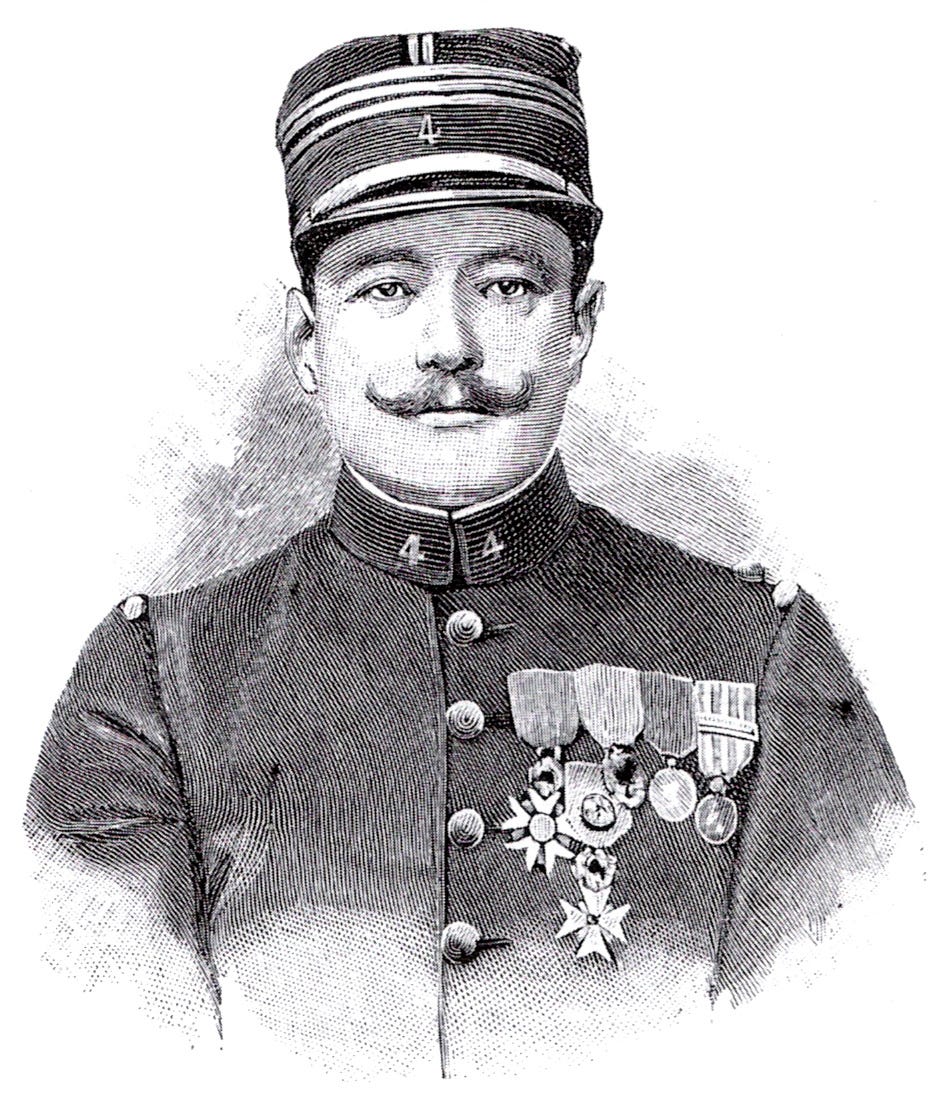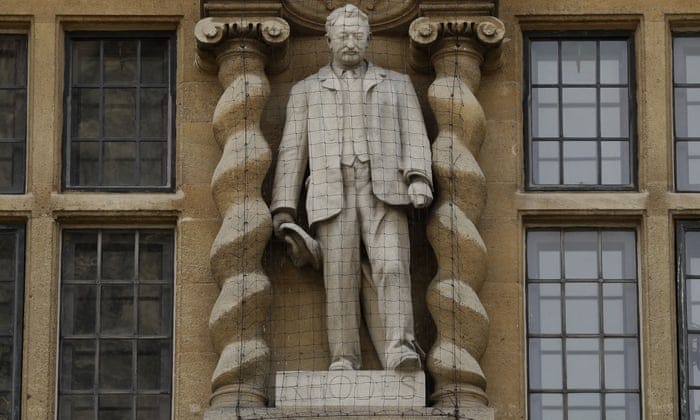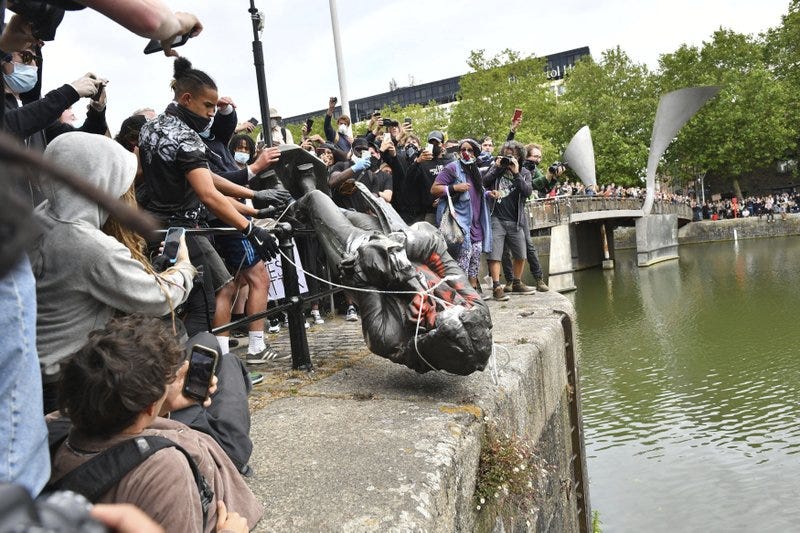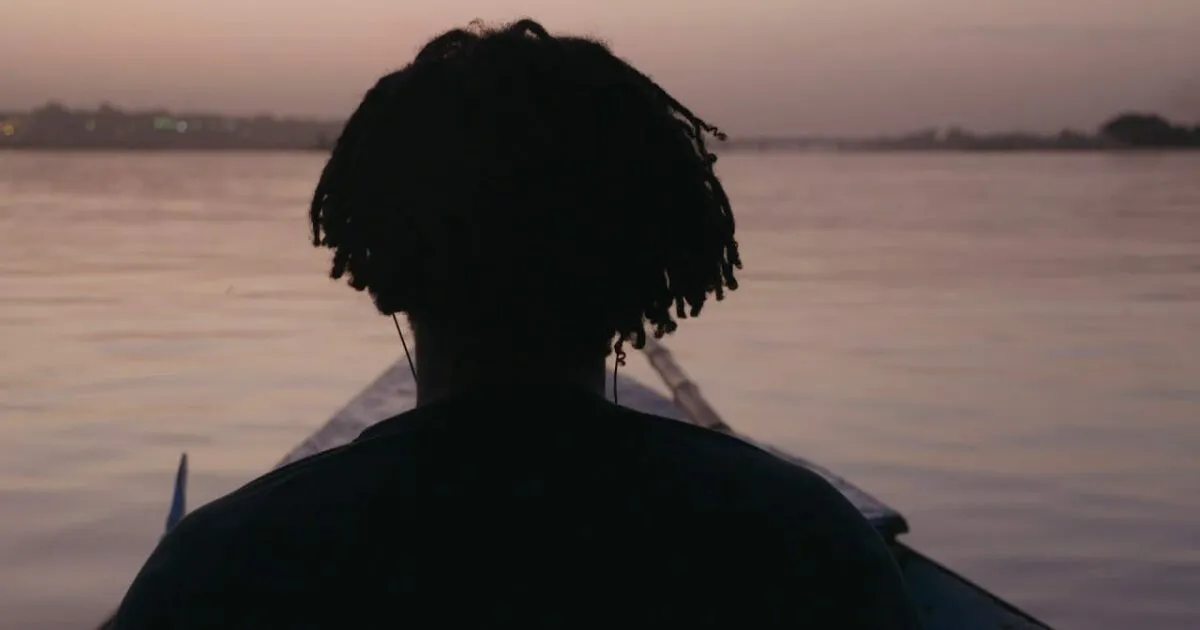At the recommendation of a friend, I recently watched Rob Lemkin’s 2020 documentary film African Apocalypse, which deals poignantly with the heavy subject of colonialism. African Apocalypse is directed by Rob Lemkin and stars British-Nigerian poet Femi Nylander, who is also its narrator. It was aired by Bertha DocHouse in the United Kingdom and Ireland on 4th February 2021 at 7pm.
African Apocalype tells the story of French imperial conquest in Niger by retracing the bloody trail of French Captain Paul Voulet, whose 1898 genocidal campaign helped establish a French colonial foothold in the region. The basic narrative motif is one of journey, and Nylander serves as the protagonist and narrator. He retraces Voulet’s journey through the literary gaze of a fictional parallel, Joseph Conrad’s Heart of Darkness.
Felt Like Home
The film, as we say in Ghanaian Pidgin English, is not on the ground.[i] I was taken back to a world I know deeply, and nostalgically. I recognised the brown colour theme of the general Sahel Savannah zone.[ii] I recognised the architecture, the clothes, the Hausa language, which was all around me growing up in the Ghanaian cities of Tamale and Bolgatanga. Also, the music, with its frenetic rhythms and wailing vocals, was reminiscent of the music of my own Gurenε ethnic group, located mainly in Ghana’s Upper East Region. The Gurenε share many cultural similarities with people from the Mali-Niger region. Indeed, Gurenε, like many Ghanaian languages, retains deep linguistic and cultural connections with the Mali Empire that flourished from the 13th to the 16th centuries. It was a golden era of empire, trade, and political diplomacy that helped to settle the political contours of pre-Colonial West Africa.[iii] Beyond nostalgia, however, the film triggered, as any good history should, reflection on its themes and closely related ones: colonialism, racism, imperial politics, the nature and purpose of history, and the difficult problem of erasure in the telling of any history. In this brief essay, I share some of these reflections.
Voulet’s Bloody Conquest
The account of Voulet’s conquest elicits a visceral reaction. The commander is dispatched into the West African interior with instructions to secure French holdings in the Chad Basin but without crossing British lines. The instruction to preferably not annoy the locals reads with noticeable nonchalance. “As seems right in your eyes” would have seemed a valid interpretation to Voulet, whose own correspondence suggests as much. As it turns out, Voulet is soon faced with a dilemma: cross British lines or hazard a treacherous passage through the desert. In the throes of internal crisis, he reaches a point of decision and breaches the British colonial frontier. It is not precisely clear why massacre becomes his modus operandi, but he leaves in his wake a long trail of smoke and blood. After he is reported by a subordinate, the French authorities seem appalled and send a detachment to stop him. But they do not shy away from the territorial profits bequeathed by the bloodshed. The film thus exposes how imperial interests rendered European colonialists complicit in horrendous atrocities. In the Q&A after the airing, a panellist noted that the French government later asked Britain for the land Voulet had conquered and received it in exchange for fishing concessions in Canada. The people did not matter. They were traded around like chattels as the land changed ownership in a capricious colonial boardgame — a real terra nullius mentality.

Brutal force was not an unknown colonial strategy, nor even sometimes an indirect one. My friend Sarah Balakrishnan has explored officially sanctioned massacres by the British in the then Gold Coast (now Ghana), where, in 1888, in a small village called Taviefe, British troops carried out possibly the largest massacre in West African colonial history by killing nearly a thousand people in retaliation for the murder of a white soldier.[iv] It stands to reason that more such atrocities will be revealed over time. Many others, unfortunately, might never be recalled.
But as much as the film says, it also leaves out certain things. All historical accounts in one way or another weave disclosure with erasure. What is not said is as important, often more so, than what is said. I got that sense almost all the way through this film.
The Political Dimension
While every documentary has a subject matter and should not reasonably be expected to cover every conceivable aspect of that subject, African Apocalypse’s silence on the background politics involved in the French government’s sending Lieutenant Colonel Jean-Fracoise Klobb to stop Voulet leaves a bit of a sour taste. In a world deeply interested in the history and continuance of oppression, and in the fight to uproot it, there is the ever-present danger that the history of race relations is unfortunately oversimplified in grand meta-narratives. This is a bit of an irony for post-modern societies. In the domain of postcolonial theological studies, for instance, there is a pervasive narrative that is almost monolithic in its representation of missionary vilification of African indigenous religions. It is only with time that the complexity entailed in these histories begins to be more critically unveiled. If African Apocalypse is a work of history, then, it provides an unsatisfactory answer to the entire question of the nature of cross-cultural and political relations between Europe and West Africa in the nineteenth century.
One instance of this is the conspicuously unexplored notion of “The French Officer.” The phrase features more than once in quoted French correspondences, one of them from Klobb. The phrase is employed in the context of incredulity. French officers, it seemed, could not believe that a “French officer” had committed the kinds of atrocities attributed to Voulet. One got the sense that something significant lay in the severally repeated expression; something perhaps like a militaristic ethic that was supposed to be embodied by it, an ethic that should not have allowed for these massacres. I hold no brief for the colonial French army. I would have been willing to be shown that “the French Officer” was nothing more than a rhetorical draping over insidious terrorism. Just as long as it was unpacked. Failing that, the Voulet of African Apocalypse rarely rises above the projection of a caricature.
Colonialism, Capitalism, and Poverty
The film also hints at a number of socio-political issues that it does not address. In one scene, a man stands on the grave of Voulet and declares that the French captain’s conquest was the beginning of the poverty of his people. This is delicate ground. It is undeniable that colonialism established and continues to nurture structures of exploitation and human denigration. This cannot be underscored enough. Nylander does not interrogate the villager’s claim, and there is no reason why he absolutely should have. But the silence is there. A vexing question shouts out from the scene, a conversation we have everywhere and every day in Africa, the only conversation that has not failed to come up wherever I have been in West Africa: how much of Africa’s problems is from the present, and how much is from the past?
Guns versus Gods
There is also the complicated matter of how to interpret Africa’s continuing encounter with the post-Enlightenment rationality of the Western industrialism that underwrote the trading ventures of colonial companies and governments around the continent. This ties in with another interesting theme arises when the shaman of a local deity describes how his village was once protected from what would have been Voulet’s first massacre. The village deity made the village invisible until Voulet’s army had passed. In another village that was not so fortunate, Nylander asks the elders why the spirits did not protect them. Two elders laugh, and very hard indeed. “Because the white man was too much for the spirits,” one of them said (subtitled). “How can you fight against people who have guns? No resistance is possible.”
This scene struck me. Such cold-faced pragmatism is not often associated with so-called traditionally oriented people. I expected a theological rationale absolving the deities. What we get instead is a cold acceptance that in the struggle between imperial expansion and indigenous survival, Western technology trumps spiritual power. The times have not quite passed when old people stare at communication gadgets and marvel at “aborɔfo beyiye,” — the white person’ witchcraft.
The divide between the “problematic” of what is possible if Africans reclaim and fully embrace their epistemological heritage and the indelible “thematic” of colonially imposed Western rationalism lies at the heart of Africa’s persistence with a swathe of socio-political constructs. For those interested, Partha Chatterjee’s discussion of this in the context of India remains seminal and instructive.[v] From the arbitrary borders that still separate tribes and families to the nation-state, Western forms of banking and financial administration, fashion, digital technologies and social media, the list is a long one. Once upon a time in the sixties and seventies, Ghanaian women who wore “kaba and slit” were berated for adopting Western dressing styles. Today, the style is hailed as “African wear” and the Dutch-made fabrics have now become “African print.” With time, the colonial provenance of both the technology and some of the oldest designs is being uncovered. For all intents and purposes, much talk in Africa of indigenous heritage and pride is belied by rather far-reaching accessions to a post-Enlightenment epistemology of government, economy, and even, dare it be said, culture. Nor is the problem swept away by references to cultural universalism or hybridity. The identity crisis remains a gnawing problem.[vi]
A Minor Theme? (Warning: graphic description)
In one segment of the film, the narrator speaks especially hauntingly about a massacre while locals slaughter cows. Blood gushes out of their tracheae. Severed heads lie motionless on the ground with final horror frozen in their eyes. Massacre. By no means is this comparable to the slaughter of human beings, of which it appears to be a visual allusion. That, at least, is what my current humanist ethic affirms. Yet, considering the length of screen time allocated to these scenes, I suspect Lemkin intended to instigate some introspection, perhaps some sympathy.
Should the ease with which I reduce the moral significance of this animal slaughter into a mere visual allusion to the ‘true’ massacre perpetuated by Voulet not reignite discussion around my — our — sense of human exceptionalism? Why does the modern preoccupation for environmental care not translate more rapidly into a respect for the sacredness of animal life? Is it valid to wonder how long it will take for our moral concern for the welfare of humanity to be consummated on a universal creaturely level? The more we know about animal physiology, behaviour, and psychology, indeed, the more Instagram reels I watch of them, the clearer it becomes that we inhabit the same emotional sphere as many animals, a biochemical sphere. If this is an insulting comparison, and some might be offended that I even bring it up, then it might be worth pondering the anthropogenic source of our anthropocentrism. Is the self-referential valid? If so, on what terms? Must it be exclusivist and would that cohere with even our broadest collectives sense of morality? Or are we, in respect of animals, just another remorseless keystone species, scraping, slaughtering, devouring?
Shedding Light on Heart of Darkness
As I mentioned at the outset, African Apocalypse is, in its entirety, mediated through Joseph Conrad’s 1902 novel, Heart of Darkness. Throughout the film, Nylander reads passages from the book, weaving them, sometimes hauntingly, always evocatively, into the images of his own quest for Voulet. Nylander travels along the “main road” of Niger — I too find it difficult to relate with the concept of the main road of an entire country — a road supposedly created as a consequence of Voulet’s bloody journey through the region. “What kind of country is this, where the main road travels over so many bodies?” he asks. He is on that road not only to see the sites of colonial horror it traverses but to reach the burial site of Voulet himself. The narration is cast as a personal journey, a quest for a personal encounter with the horrific, which reaches its zenith at the grave of the tyrant. It is a quest, in a sense, for the heart of darkness. Nylander uses Conrad’s novel as a motif. In the novel, a narrator, Marlow, journeys into the Congo basin in search of Mr Kurtz, who is murdering and pillaging throughout the forest region. Marlow’s narration, in many places, gets fused into Nylander’s.
The effect is certainly a powerful one. A lover of good literature will appreciate the pathos which Conrad’s words help to generate in the film. By the same token, however, one would have hoped for a little more engagement with a work that is itself fraught with accusations of racism and colonial imperialistic logic. Chinua Achebe famously castigated the book as the clearest manifestation he had seen of the need
“in Western psychology to set Africa up as a foil to Europe, as a place of negations at once remote and vaguely familiar, in comparison with which Europe’s own state of spiritual grace will be manifest.”
“Heart of Darkness projects the image of Africa as ‘the other world,’ the antithesis of Europe and therefore of civilization, a place where man’s vaunted intelligence and refinement are finally mocked by triumphant beastiality… I am talking about a book which parades in the most vulgar fashion prejudices and insults from which a section of mankind has suffered untold agonies and atrocities in the past and continues to do so in many ways and many places today. I am talking about a story in which the very humanity of black people is called in question.”[vii]
Achebe’s critique is now published in some critical editions of Conrad’s work. But Conrad has his defenders, and David Denby has given as good an apology as I have seen. “It’s perfectly true,” he says, “that ‘Heart of Darkness’ contains a few widely spaced and ambiguous remarks that appear to praise the British variety of overseas domination. But how much do such remarks matter against the overwhelming weight of all the rest — the awful sense of desolation produced by the physical chaos, the death and ravaging cruelty everywhere?” In short, Heart of Darkness is itself of historically contested cultural and political significance—Achebe campaigned for the book to be removed from literature curriculums! At the same time, I know ardent African anti-colonialists who cannot stop recommending Conrad… for the beauty of the writing! All have their reasons.

At the beginning of the documentary, Nylander tells of how he has frequently walked past the statue of Cecil John Rhodes, which stands at Oxford University’s Oriel College. At the end of the film, he shows sympathy for the removal of the statues of colonial slave traders and racists businessmen. But he mediates this with Heart of Darkness, decided that in it, Conrad is trying to awaken the European conscience to the horrors of colonialism. I do not necessarily take issue with Nylander’s favourable disposition towards Heart of Darkness. I am, for better or worse, one of those who still do the politics after the art whenever they can, and I often can. In a 2020 interview for BFI, Nylander says “there are so many parallels that it would have been a waste not to use that kind of cinematographic, compelling story.” Nylander and the filmmakers appear sufficiently reflexive about the challenges of the book: “I think we use the text, but we don’t allow the text to use us.” Indeed, answering a question on whether he is “telling the story of Africa only through a colonial archetype,” Lemkin said that he believed in their film was “subverting the archetype” that is Mr. Kurtz.[viii]
This is all well and good (even though, frankly, the subversion was lost to me in the viewing). However, in order to be thusly open to Lemkin’s reliance on Heart of Darkness, I think, one needs to accept, yet again, that deep, uncomfortable truth that lies in the Heart of Darkness and at the heart of all human relations: complexity. It is, however, a truth many are unwilling to hear much about these days. A postmodern (mostly) Western world seems sold instead on a critical-theoretical meta-narrative of power relations. To be sure, I believe it is a largely correct meta-narrative, but unlike many, I have not yet given up entirely on meta-narratives, suspicious as I have become of them. This is why I strongly identify with today’s great movements for social justice and equality. It is not possible to be fully abreast with the complexities surrounding racism, sexism, modern colonialism, or any other contemporary social ill — only sufficiently so. It is not possible to be anti-racist without submitting to overarching socio-historical narratives, at least to some degree. We are, as a generation, theorising away overarching explanations at the same time as we are becoming, more and more, people of the old, old stories.
And yet something in me cannot shirk the gnawing reminder of complexity; a sense, to use Anthony Grayling’s apt phrasing, of “the alloy that is human history.” That so few people seem to have much appetite for complexity-based analyses of the social issues that confront us today is, to say the least, troubling, and this film’s many silences unfortunately render it complicit. For a woke generation, nuance, when it is rhetorically acknowledged, is a mark of intellectual erudition. Methodologically and analytically applied, however, it becomes the very flag of naivete, and the worst, treacherous complicity. The danger of the single story remains a real and present one for us all.[viii]

A Luta Continua
My last reflection is on a theme the film covers very well: the continuance of colonialism into the present day. The Uranium mines that were established to feed French industry still run, supplying electricity in 1 in 3 electric bulbs in France, while Nigeriens grope in the darkness. Adichie has put to eloquent words what many have felt for a long time: that French colonial interests persist in Francophone West Africa in ways that are deeply troubling. She mentions the CFA Franc, but one might think of several political and military interventions over the last few decades. But here, the conversation must broaden to a consideration of how new global political and economic structures re-enforce colonial control on a global scale. Then it may be realised that militaristic expressions of this colonial arrangement are only ever its own confirmation. As far as Africa is concerned, colonialism is not the stump of a long-felled tree. It is a fig in full bloom, and its harvesters have never been disappointed with the fruitage.
African Apocalypse is a sobering reminder of the struggle for self-determination that needs to continue today. But the fight has deepened and broadened. Thankfully Lemkin’s documentary is a rewarding one, for as Nylander and his guides drive through the untarred roads of the Nigerien Sahel in search of Voulet’s resting place, they throw up behind them the dust of today’s social vexations. What will we see when the cloud settles?
Notes
African Apocalypse is available to view at bfi.org.uk
[i] “E no dey ground,” meaning, not easy, simple, or trivial.
[ii] Very similar to the Sudanian Savannah found in much of northern Ghana.
[iii] For more, see Ivor Wilks. Ghana: One Country, Many Histories.1996.
[iv] Unpublished manuscript.
[v] Partha Chatterjee, Nationalist Thought and the Colonial World (London: Zed Books, 1986).
[vi] For more, see Homi Bhabha, The Location of Culture (Abingdon: Taylor & Francis Group, [1994] 2004).
[vii] Chinua Achebe, “An Image of Africa: Racism in Conrad’s ‘Heart of Darkness’,” Massachusetts Review 18 (1977). Reprinted at https://polonistyka.amu.edu.pl/__data/assets/pdf_file/0007/259954/Chinua-Achebe,-An-Image-of-Africa.-Racism-in-Conrads-Heart-of-Darkness.pdf. Accessed February 10, 2021.
[viii] Kaleem Aftab, “‘Colonialism is the ultimate cancel culture’ — Femi Nylander and Rob Lemkin on their Heart of Darkness riff African Apocalypse,” https://www.bfi.org.uk/interviews/femi-nylander-rob-lemkin-african-apocalypse.
[ix] Chimamanda Ngozi Adichie, “The Danger of a Single Story,” https://www.ted.com/talks/chimamanda_ngozi_adichie_the_danger_of_a_single_story.

